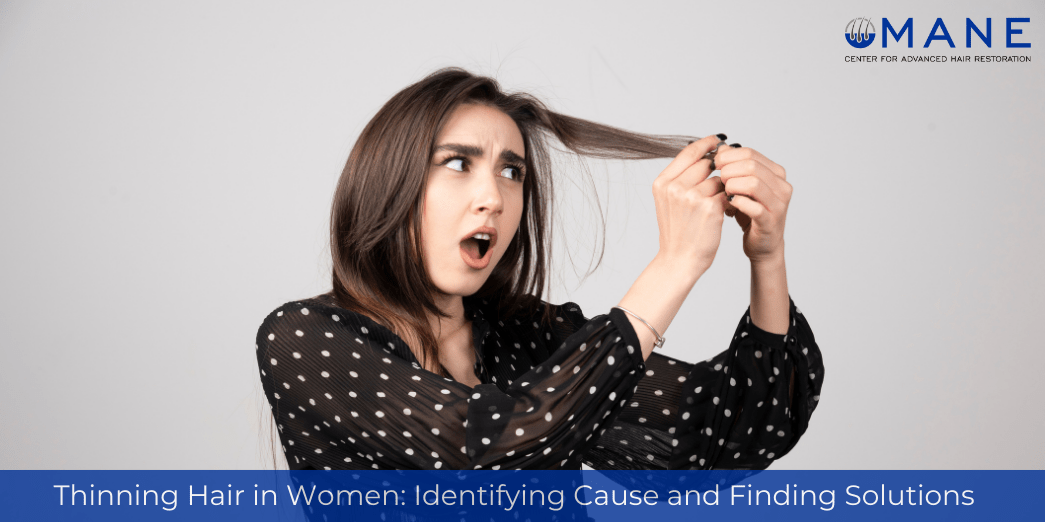


Hair is often considered a woman's crowning glory, significantly affecting her self-esteem and overall appearance. For many women, thinning hair can be a distressing experience, affecting confidence and sense of identity. Understanding the importance of hair in a woman's life, it's crucial to explore the various treatment options and solutions available for thinning hair. From lifestyle changes and topical treatments to advanced medical procedures, women experiencing hair thinning have various effective options to help restore hair's fullness and vitality.
Hair loss in women is a common yet often overlooked problem, affecting millions worldwide. Unlike men, where hair loss usually presents as a receding hairline or bald spots, women often experience diffuse thinning over the entire scalp. This condition can lead to significant emotional distress and impact self-esteem.
Exploring hair loss involves understanding the intricacies of the hair growth cycle, which consists of three main stages:
Additionally, differentiating between normal and abnormal hair loss is crucial. While shedding 50-100 hairs daily is normal, persistent shedding beyond this range indicates an underlying case. Signs of excessive hair loss include a widening part, reduced hair density, increased scalp visibility, and noticeable shedding.
Early diagnosis enables targeted interventions addressing genetics, hormonal imbalances, nutritional deficiencies, or scalp conditions to prevent further hair loss and promote healthy regrowth.
Let’s explore the various causes of hair loss.
Here's an overview of the factors contributing to hair loss:
Stress: Chronic stress can disrupt the hair growth cycle and lead to temporary hair loss.
Hairstyles and Treatments: Tight hairstyles, chemical processing, and heat styling can damage hair and contribute to breakage.
Diet: Nutritional deficiencies, particularly iron, protein, and specific vitamins, can affect hair growth.
Hormonal Changes: Fluctuations in estrogen and androgen levels can trigger hair loss, particularly after pregnancy, childbirth, menopause, or menstrual cycles.
Medical Conditions: Certain conditions like thyroid disorders, anemia, and autoimmune diseases can cause hair loss.
Medications: Some medications, such as chemotherapy drugs and certain birth control pills, can have hair loss as a side effect.
Female pattern hair loss (FPHL): This genetic condition causes a gradual hair thinning on the scalp, similar to male baldness.
Scalp Infections: Fungal and bacterial infections can cause hair loss in localized patches.
Psoriasis and Eczema: These inflammatory skin conditions can affect hair follicles and lead to hair loss.
The signs of thinning hair in women include:
If not addressed promptly, these symptoms can gradually worsen over time. Recognizing these signs early and seeking treatment can prevent further hair loss and promote regrowth.
When it comes to addressing a thinning hairline, several effective treatment options for women are available:
Adopting a healthy lifestyle can significantly impact hair health. Regular exercise, a balanced diet rich in vitamins and minerals, and reducing stress can improve hair growth and reduce thinning.
Supplements like biotin, iron, and vitamin D can help strengthen hair and promote growth. However, consulting a healthcare provider before starting any new supplement regimen is essential.
Over-the-counter treatment that can stimulate hair growth and slow down hair loss. It's applied directly to the scalp and is available in various strengths.
Sometimes, prescribed medications for hair loss or oral contraceptives can help balance hormones and reduce hair thinning. Consulting with a dermatologist is crucial to determine the best course of action.
Thinning hair in women can be distressing, but understanding the causes and available treatments can help manage this condition effectively. Early intervention is key to preventing further hair loss and promoting regrowth. Consult with a healthcare professional or dermatologist to explore personalized treatment options tailored to your needs.
Ready to reclaim thicker, healthier hair? At Mane Center for Advanced Hair Restoration in Chevy Chase, MD, our experts are here to tailor a treatment plan just for you, helping you achieve the hair you've always wanted. Take the first step towards revitalizing your hair and boosting your confidence!
Contact us to schedule an appointment for more information.